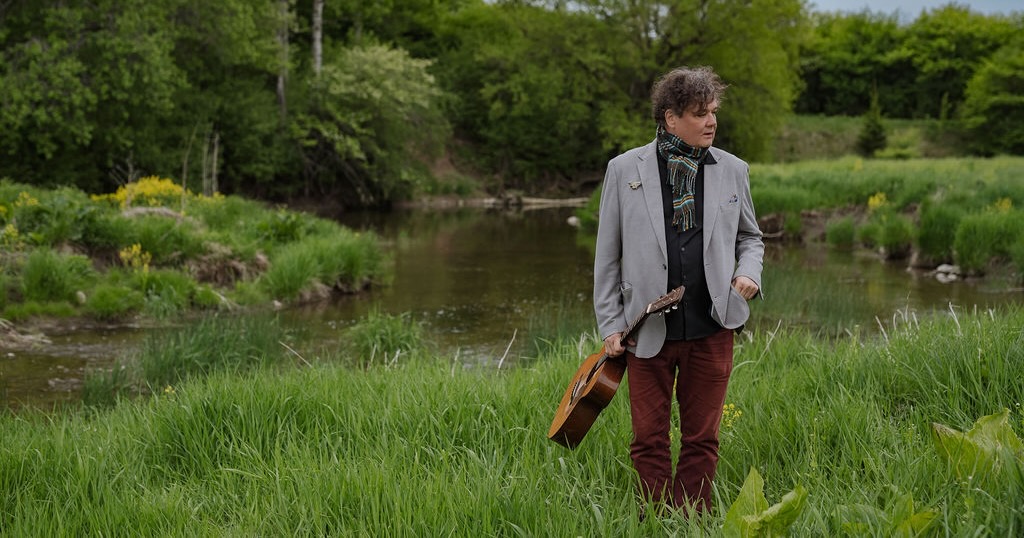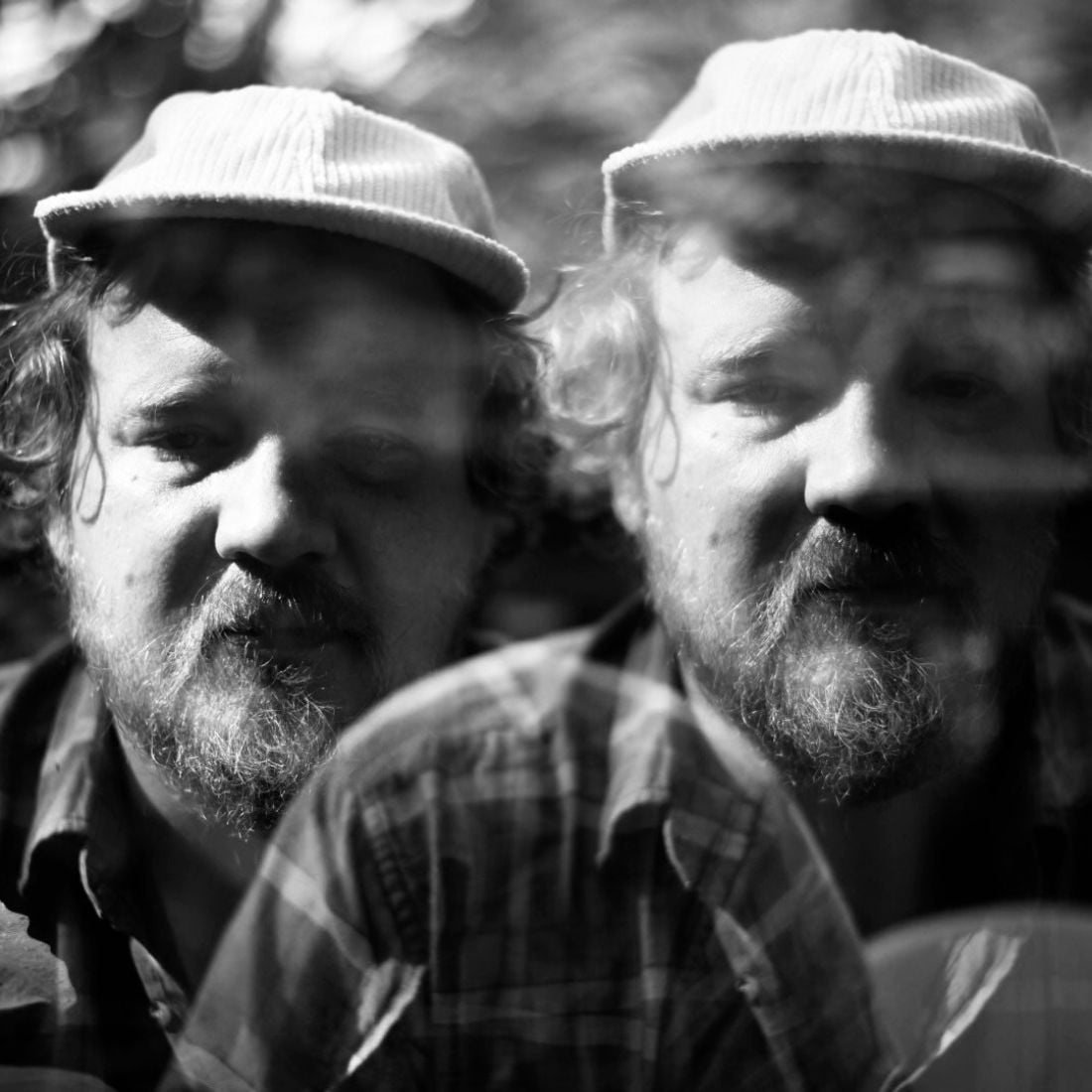Now appearing in the role of nasty Bill Sikes in the musical Oliver! — Ron Sexsmith?
Well, not exactly. But Sexsmith had the character of Sikes in mind (specifically as played by Oliver Reed in the movie) when he wrote the original version of “Damn Well Please,” a jaunty, pointed highlight of his new album, Hangover Terrace.
The song was initially intended as part of a musical Sexsmith was creating based on Deer Life, a fairytale book he wrote and illustrated, that was published in 2017.
“There’s this villain character that was going to sing that song,” Sexsmith, a great fan of classic musical theater, says on a video chat with BGS from his home in Stratford, Ontario, Canada. “I just remember thinking how Oliver Reed played Bill Sikes. But he didn’t sing, because the director said as soon as the villain starts singing it takes away from his threatening element. And I thought that was smart.”
So, while he is still looking to bring the musical to the stage, he had put this song in a drawer. Eventually, though, he reworked it as a screed against what he sees as oversensitivity endemic to our era, with everyone so easily offended, and set it to perky Baroque-pop music and a tone bearing more than a shadow of classic Ray Davies.
“I refashioned the lyrics to be more about a kind of grumpy, bickering kind of thing,” he says. “Just because sometimes I’ll get mad or because [he and his wife Colleen Hixenbaugh] will bicker sometimes about my wine consumption. And I’ll be like, ‘I can have wine.’ Or whatever. And I just felt that it was fun to sing. We tried it out in a concert recently and it went over really big.”
Now, just in case you’re confused, yes, this is that Ron Sexsmith – Mr. Sensitive himself, Mr. Melancholy, Mr. “Secret Heart” (the first song on his first real album, 1995’s Ron Sexsmith, and arguably his most enduring and much-covered number). All vulnerable and romantic.
Yes, it’s him, the guy known for wearing his heart on his sleeve, weaving his feelings into stunningly indelible melodies sung with engaging understatement, all endearing him to fans throughout North America and Europe, earning him 15 Juno Awards (including eight as Canadian Songwriter of the Year) and a 2010 documentary, Love Shines. The guy who has been lavishly praised by countless fellow artists, notably among them Elvis Costello, Nick Lowe, Steve Earle, Daniel Lanois, and Feist.
That Ron Sexsmith is here, slinging arrows at people he sees as too sensitive. “I’m intent on poking the bear,” he sings.
“It’s just kind of a song about the culture we’re in now, there were a lot of people tip-toeing around and afraid to offend all the time,” he says of “Damn Well Please.” “And I think maybe we’re coming out of that a bit now. When I played it live, there were some people who came up afterwards and told me they found it really empowering.”
He laughs.
“I don’t want to empower the wrong people, though.”
The fact is, he is feeling empowered to show that edgy side a bit more. While there is plenty of the sensitivity, the romance, the explorations of heart on this, his 17th studio album in three decades, there are several songs that show this trait, lashing out some at matters both cultural and personal.
In “Camelot Towers,” another with a clear nod to his Kinks devotion in its sharp view and Baroque-pop tones, he expresses disgust at the proliferation of fancifully named housing projects that in reality are blights. In “Outside Looking In,” with Hixenbaugh chiming in as something of a Greek chorus, he suggests that “some friends should come with expiry dates.”
Mr. Costello, one of his biggest heroes and biggest fans (as a songwriter he has ranked Sexsmith with Paul McCartney and Tim Hardin), famously arrived in the punk era bearing the tag of “angry young man” before later evolving with great emotional nuance. Has Sexsmith gone the other way, from genteel young balladeer to, at 61, an angry, uh… mature man?
“I guess it’s better late than never,” he says, a wry smile and shrug tilting his country-gentleman hat and large wire-rim glasses.
“I mean, my earlier albums were more melancholy and kind of sad, just based on what was happening. But I had a song on [2004’s] Retriever called ‘Wishing Wells’ that was kind of angry. And I’m sure I could go and find those songs throughout my career. They exist before this. Maybe they don’t all exist in one place like on this album.”
Make no mistake: He still wears his heart on his sleeve. In fact, the opening line of “Easy For You to Say” is “I wear my heart is on my sleeve.” And the very first words of the album’s first song, “Don’t Lose Sight,” are “Hearts get broken,” sung with great vulnerability.
In other places there’s the romance of wistful, poignant nostalgia, as in “Cigarette and Cocktail,” a colorful portrait of the seemingly carefree life of earlier generations with “a cigarette in one hand and a cocktail in the other.”
“I wanted to express the full range of emotions, human emotions. I don’t want to be the master of one emotion, like some people do these days. ‘That’s the guy who writes all the sad songs,’ or ‘that’s the guy who writes all the ironic songs,’ you know. I want to be an actual human being.”
Hence Hangover Terrace spans from pastoral (“House of Love,” a lovely ballad with brass that’s an ode to “a dirty happy home” filled with play and laughter) to perky pop (“It’s Been a While,” his account of a reunion with his old bandmates, with “shades of our yesterdays” and ‘80s-ish Casio-like keyboard lines) to pumping power-chords (“Burgoyne Woods,” with a little spirit of the Who). Produced by Martin Terefe – who has worked with artists from James Blunt to Engelbert Humperdinck and produced three Sexsmith albums in the 2000s – at his bustling London studio complex, it features among its musicians former Pretenders/Paul McCartney guitarist Robbie McIntosh (he provided the Townshend-esque licks to “Burgoyne”) and keyboardist Ed Harcourt (a fine singer-songwriter in his own right). But for the variety, or because of it, there’s a flow, an arc – it’s not a big leap to imagine the album as being the tuneful bones of a musical or narrative song cycle.
“I think I could probably write a story where these songs would fit,” he says, noting that no one had mentioned that before. “In all my albums there is a document of a particular time or phase that I was going through. So definitely with this record it was coming off the heels of the pandemic and all that stuff. You could probably write a story. I don’t know if I’m the guy to do it. But yeah, I’m going to think about that.”
Much of this, he says, reflects the life he and Hixenbaugh have led since moving from Toronto to Stratford seven years ago. Especially the theater orientation.
“Stratford, where I live now, is an internationally renowned theater town,” he says. “People come here from all over to see the plays and musicals. Maggie Smith worked here, and Christopher Plummer. I really love the theater and feel we’ve landed in a kind of oasis. The world is going crazy and we’re going to plays and all. I can’t believe our luck that we ended up here.”
Even outside the theaters, in this Stratford, as that bard from the other Stratford put it, all the world’s a stage. The players there? Superb. And for this Canadian bard?
“It’s been inspiring,” he says. “We have a yard with all these critters running around, like rabbits and things. We had an owl. Didn’t have that in Toronto. I feel like Beatrix Potter or Huckleberry Finn. It’s a whole different way to live.”
That has also brought out a wistfulness that counters, or at least complements, some of the hotter feelings expressed. Take “Burgoyne Woods,” a look back to a time in his life when the world was open and the radio rocked.
“It’s a very nostalgic song for me,” he says. “Every song on this album has its own character and personality. Here, I like rock. I love The Who and all that stuff. I was trying to write that kind of thing they do. It’s about a time in my life with my high school friends and we’d just go on trips through the woods near our house.”
That was his hometown of St. Catherines, down near the Niagara Falls/Buffalo area.
“It was that free-range period where your parents don’t know what you’re doing,” he says. “You’re just out there and just, you know, doing things you shouldn’t do. And drinking.”
So sort of his “Cigarette and Cocktail.”
“Yes,” he says. “Exactly.”
Even in “Camelot Towers” Sexsmith has found himself considering the humanity within the walls of the eyesores. “I’m just noticing, I mean, obviously people live there and they make the most of it,” he says. “And my son [one of two adult children from a previous marriage] lives in a place like that. You walk the halls and you can hear the people or you smell the different foods that everyone’s cooking. I kind of get into that in the last verse. Everybody needs a home and a home is what you make it.”
So yeah. Mr. Sensitive hasn’t gone anywhere.
And how does he bring the curtain down on Hangover Terrace? Well, he’s sensitive there too. Several songs before the album’s close, in “Please Don’t Tell Me Why,” a buoyant folk-rocker reminiscent perhaps of the Beatles’ “I Will,” he lets us know what to expect, or not to expect. He’s all about cherishing the moment, relishing the life and love he’s built with Hixenbaugh, savoring the theater and the wildlife around their home, without looking down the road:
I don’t want to hear
Don’t want to know
The trouble that surrounds
The happiness we’ve found
Don’t want to see
The way our story ends
That might even bring a tear to Bill Sikes’ cold eyes.
Photo courtesy of Cooking Vinyl.



